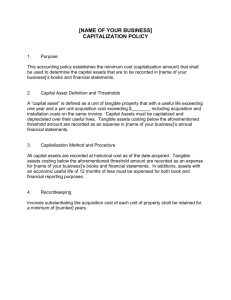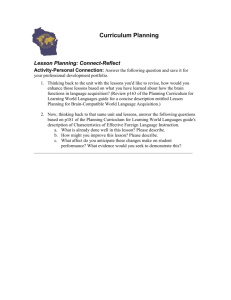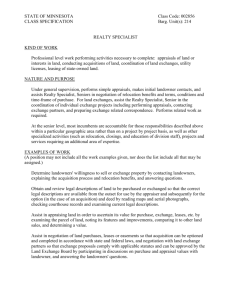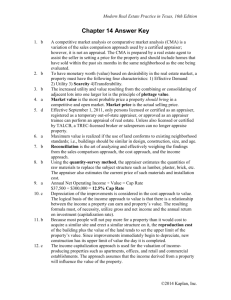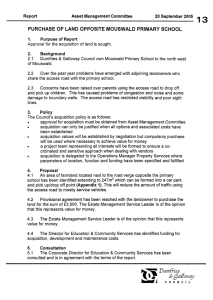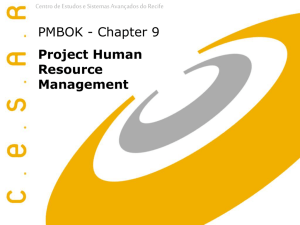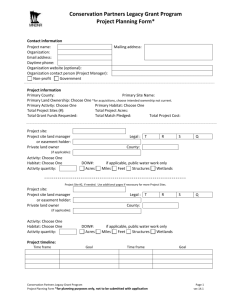Power Point Presentation only - International Right of Way Association
advertisement
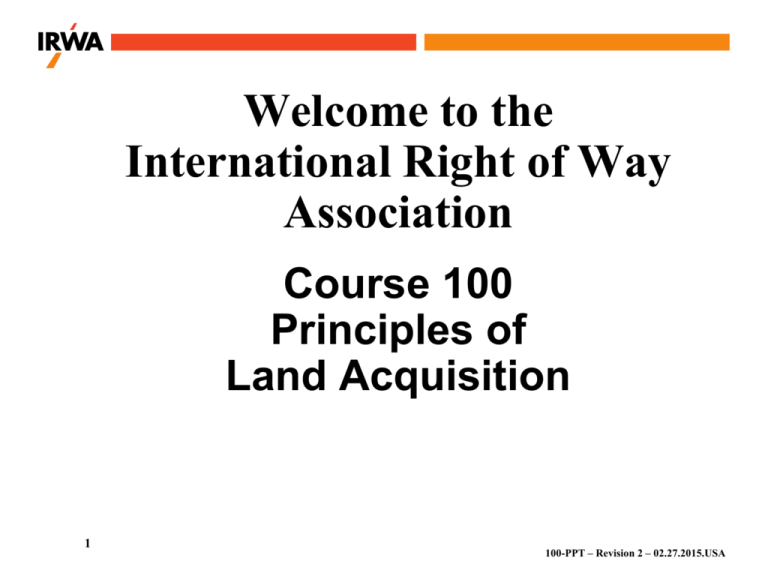
Welcome to the International Right of Way Association Course 100 Principles of Land Acquisition 1 100-PPT – Revision 2 – 02.27.2015.USA Introductions Who we are… What we do… Where we do it… How long we’ve been doing it… Our goals for the course... 2 Objectives (1) At the conclusion of the four days, you will be able to... • Define real property law terms and concepts. Apply the terms and concepts to right of way acquisition • Discuss the effects of a public project on the 3 environment. Recognize some of the major U.S. environmental acts. Explain the types of environmental studies Objectives (2) At the conclusion of the four days, you will be able to... • Describe and demonstrate the three view concept of engineering plans. Understand and discuss the significance of property descriptions and the difference types used • Demonstrate a basic understanding of the valuation process and the role of the appraiser in the acquisition process 4 Objectives (3) At the conclusion of the four days, you will be able to... • Discuss right of way negotiation, including its various components from preparation to closing • Express a basic understanding of the federal laws related to the relocation of residential and business occupants • Express a basic understanding of property management concepts 5 Housekeeping 6 Schedule Day One and Day Two 7 (1) 8:00 - 8:30 Introductions, Etc. 8:30 - 12:00 Property Law Concepts 1:00 - 4:45 Environmental Concerns 8:15 - 12:00 Property Descriptions 1:00 - 4:45 Appraisal Schedule Day Three and Day Four 8:30 - 10:15 10:30 - 12:00 1:00 - 4:45 8:15 - 12:00 1:00 - 2:45 3:30 - 5:00 8 (2) Appraisal Negotiation Negotiation Relocation Assistance Property Management Exam Property Law Concepts 9 Objectives Property Law Concepts • Define real property law terms and concepts. • Apply the terms and concepts to right of way acquisition 10 Types of Laws Civil law based on written codes or laws Common law evolved from early court decisions 11 Real Estate Real estate is the physical land and the objects that are permanently affixed to the land. 12 Real Property (1) Real property is all the rights, interests and benefits inherent in the ownership of the real estate. It is the bundle of rights. 13 Real Property (2) Real property is all the rights, interests and benefits inherent in the ownership of the real estate. It is the bundle of rights. 14 Personal Property and Fixtures Personal property is the items that are not affixed to the real estate. Fixtures are items that were once personal property but have since been permanently attached to the real estate. 15 Types of Ownership Owners in Severalty Concurrent Ownerships Joint Tenancy Tenancy by the Entirety Tenancy in Common Community Property 16 Contract (1) A contract is an agreement between parties, creating an obligation for which the law provides a remedy for breach. 17 Contract (2) • • • • 18 Mutual consent or agreement Competent parties Lawful consideration Lawful subject matter Estates Fee simple estate Life estate Lease interests (leased fee and leasehold) Easements 19 Easement An easement is a non-possessory interest one has in the property of another for a specific purpose. 20 Easement Appurtenant Easement Appurtenant is an easement for the benefit of another real estate parcel. “Runs with the land.” 21 Easement In Gross (1) Easement In Gross benefits a person or entity, rather than another real estate parcel. It may be personal or commercial. 22 Transfer of Title Deed or Grant Descent and Distribution (intestate succession) Devise (will) Eminent Domain Occupancy/Adverse Possession 23 Usual Descent 1. 2. 3. 4. 5. 6. 7. 8. 24 Surviving spouse and children Brothers and sisters Parents Aunts and uncles and nieces and nephews Grandparents Cousins Second cousins, etc. Escheat Other “Rights” Rights of Way Profits a Prendre Licenses/Permits 25 Environmental Concerns 26 Objectives Environmental Concerns • Discuss the effects of a public project on the environment • Recognize some of the major U.S. environmental acts 27 • Explain the types of environmental studies and what each type hopes to achieve Environment Environment is the combination of conditions that affect and influence the growth, development and survival of living things. 28 Environmental Legislation (1) Rivers and Harbors Act Clean Air Act National Historic Preservation Act National Environmental Policy Act The Clean Air Act Federal Water Pollution Control Act Amendments Endangered Species Act 29 Environmental Legislation (2) Safe Drinking Water Act Toxic Substance Control Act Resource Conservation and Recovery Act Federal Water Pollution Control Act Comprehensive Environmental Response, Compensation and Liability Act Superfund Amendments and Reauthorization Act Clean Water Act 30 Environmental Review Assessment Processes The environmental review is a review and decision process for evaluating the impact that actions will have on the environment. An environmental assessment is an action to determine and manage risks associated with the acquisition of property that may be environmentally impacted. 31 Day One Recap Today we... • Defined real property law terms and concepts. Applied the terms and concepts to right of way acquisition • Discussed the effects of a public project on the environment. Recognized some of the major U.S. environmental acts. Explained the types of environmental studies 32 Day Two We will... • Describe and demonstrate the three view concept of engineering plans. Understand and discuss the significance of property descriptions and the difference types used 33 • Start to demonstrate a basic understanding of the valuation process and the role of the appraiser in the acquisition process Property Descriptions 34 Objectives Property Descriptions • Describe and demonstrate the three view concept of engineering plans. • Understand and discuss the significance of property descriptions and the difference types used. 35 Three View Concept Plan View Profile View Cross section View 36 Plan View (1) 37 Plan View (2) 38 Profile View 39 Cross Section View 40 Mason and Dixon 41 Public Land Survey System (1) 42 Public Land Survey System (2) 43 Public Land Survey System 44 (3) Public Land Survey System (4) 45 Metes and Bounds 46 Bearings 2 1 4 47 3 Lot and Block 48 Centerline 49 Point 50 Appraisal 51 Objectives Appraisal • Demonstrate a basic understanding of the valuation process and the role of the appraiser in the acquisition process 52 Appraisal An appraisal is the act or process of developing an opinion of value. An opinion of value. An appraisal is a written statement … setting forth an opinion of value … supported by the presentation and analysis of relevant market information. 53 D.U.S.T. (Factors that create value) Demand: The desire or need for real estate. Utility: Usefulness. Scarcity: The supply of real estate in relation to demand. Transferability: Title must be able to pass. 54 Market Value Market value is a type of value, stated as an opinion, that presumes the transfer of a property … as of a certain date, under specific conditions (… relationship, knowledge, motivation, terms of sale, conditions of sale). 55 Value Principles (Principle of Substitution) When several similar goods or services are available, the one with the lowest price will attract the greatest demand. 56 Value Principles (Principle of Supply and Demand) The price of a good or service varies directly with demand and inversely with supply. 57 Value Principles (Principle of Anticipation) Present value is created by the expectation of future benefits. 58 Value Principles (Principle of Contribution) The value of a particular component is measured by its contributory value to the property or the amount of its absence detracts from the whole. 59 Valuation Process Appraisal Problem Definition Scope of Work Data Collection and Analysis Land Value Opinion Three Approaches to Value Reconciliation and Final Value Opinion Defined Value Opinion Report 60 Highest and Best Use The reasonably probable and legal use that is physically possible, appropriately supported, and financially feasible, and that results in the highest value. • Physically possible? • Legally permissible? • Financially feasible? • Maximally productive? 61 Three Approaches to Value • Cost Approach • Sales Comparison • Income Capitalization Approach 62 Cost Approach • Develop a value opinion for the land • Estimate the cost new of the improvement • Deduct depreciation • Add land value opinion to the depreciated improvement value 63 Sales Comparison Approach • Research the market for comparable data • Develop relevant units of comparison • Compare the sales to the subject and adjust for dissimilarities • Reconcile the value indications into a final value opinion 64 Day Two Today we... • Described and demonstrated the three view concept of engineering plans. Understood better and discussed the significance of property descriptions and the difference types used. • Started to demonstrate a basic understanding of the valuation process and the role of the appraiser in the acquisition process 65 Day Three Today, we will... • Finish discussing the valuation process and the role of the appraiser in the acquisition process • Discuss right of way negotiation, including its various components from preparation to closing 66 Valuation Process Appraisal Problem Definition Scope of Work Data Collection and Analysis Land Value Opinion Three Approaches to Value Reconciliation and Final Value Opinion Defined Value Opinion Report 67 Income Capitalization Approach The conversion of income into value through a rate or a ratio. • Gross rent multipliers • Direct capitalization 68 Income Capitalization Approach Gross Rent Multipliers Gross Rent Multiplier = Sale Price Gross Rent 69 Income Capitalization Approach • Estimate the subject’s annual potential gross income • Determine a vacancy and collection loss • Subtract the vacancy and collection loss from the potential gross income • Estimate annual property expenses and subtract the expenses from the effective gross income to arrive at the net operating income • Develop a capitalization rate • Convert the net operating income into value 70 Income Capitalization Approach Direct Capitalization Value = Net Operating Income Capitalization Rate 71 or Vo = NOI Ro Valuation Process Appraisal Problem Definition Scope of Work Data Collection and Analysis Land Value Opinion Three Approaches to Value Reconciliation and Final Value Opinion Defined Value Opinion Report 72 Partial Acquisitions (1) Larger parcel is the total property before the taking. • Contiguity • Title • Use Value of the part taken is determined by multiplying the quantity taken times the before unit value of the item 73 Partial Acquisitions (2) Damages to the remainder property represent the loss in value to the remainder property as a result of a partial acquisition Benefits to the remainder property represent the increase in value to the remainder property as a result of a partial acquisition 74 Partial Acquisitions (3) Federal (Before and After) Rule is the difference between the value before the acquisition and the value after the acquisition State (Summation) Rule is the value of the part taken plus (damages to the remainder property minus benefits to the remainder property [the damages minus the benefits cannot be less than zero dollars]) 75 Negotiation 76 Objectives Negotiation Discuss right of way negotiation, including its various components from preparation to closing 77 Negotiation … the process by which two or more people resolve differences to reach a mutually acceptable agreement. 78 Conditions Necessary... Issues must be negotiable Parties must be willing to negotiate Parties must trust each other 79 Trust Placing confidence in another, based on that person’s character, ability, strength or truthfulness 80 Roles Agency Property Owner Taxpayer/Ratepayer Acquisition Team Problem Solver Facilitator Closer 81 Other Types of Negotiation Integrative Bargaining Attitudinal Intra-agency 82 Integrative “Win-Win” Mutually beneficial outcomes Inquiry Collaborative 83 Bargaining “Win-Lose” “Zero-Sum” Advocates positions Compromise 84 Attitudinal Trust Common ground Shared frame of reference 85 Intra-agency Intra-organization 86 Characteristics (1) Credibility Expertness Trustworthiness Power/Dynamism 87 Power 88 Legitimate Reward Coercive Reverent Charismatic Expertise Situation Information Characteristics (2) Courage Empathy Integrity/Ethics Patience 89 The Funnel Technique I. Information Getting II. Information Giving III. Problem Census IV. Problem Solving V. Closing 90 A Plan Analyze Develop Optimize Incorporate “Rules” BATNA 91 Day Three Today we... • Finished discussing the valuation process and the role of the appraiser in the acquisition process • Discussed right of way negotiation, including its various components from preparation to closing 92 Day Four Today, we will... • Express a basic understanding of the federal laws related to the relocation of residential and business occupants • Express a basic understanding of property management concepts • Review the course and take an exam 93 Relocation Assistance 94 Objectives Relocation Assistance • Express a basic understanding of the federal laws related to the relocation of residential and business occupants 95 Uniform Act Objectives • Advisory assistance in locating replacement housing and replacement business sites • Financial assistance to pay the cost of relocating personal property and to help those displaced to secure comparable replacement housing 96 Residential Relocation Assistance 97 Advisory Assistance Interview Information Inspection Transportation 98 Timely written notice Residential Relocation Assistance 99 Moving Expenses Schedule Method Actual Cost Combination 100 Payment Options (1) 101 Payment Options (2) 102 Payment Options (3) 103 Payment Options (4) 104 Payment Options (5) 105 Payment Options (6) 106 Business Relocation Assistance 107 Advisory Assistance Interview Information Assistance Timely written notice 108 Business Relocation Assistance 109 Property Management 110 Objectives Property Management • Express a basic understanding of property management concepts 111 Property Management … the process of maintaining and creating value in real property consistent with the owner’s objectives. 112 Asset Management Involves… Fiscal Management Physical Management Administrative Management 113 Property/Asset Management Goals Meet agency expectations Ensure performance Improve capacity Reduce vacancy Increase revenue Enhance value Provide flexibility 114 Increase social/community benefits Inventories Complete Property Listing General Information Property Classifications 115 Objectives (1) At this point, you are able to... • Define real property law terms and concepts. Apply the terms and concepts to right of way acquisition • Discuss the effects of a public project on the environment. Recognize some of the major U.S. environmental acts. Explain the types of environmental studies 116 Objectives (2) At this point, you are able to... • Describe and demonstrate the three view concept of engineering plans. Understand and discuss the significance of property descriptions and the difference types used • Demonstrate a basic understanding of the valuation process and the role of the appraiser in the acquisition process 117 Objectives (3) At this point, you are able to... • Discuss right of way negotiation, including its various components from preparation to closing • Express a basic understanding of the federal laws related to the relocation of residential and business occupants • Express a basic understanding of property management concepts 118 Thank you! 119 100-PPT – Revision 2 – 04.15.2013.USA
